COVER- Attack of the clones? Have freedom and tradition taken a back seat to fan uniformity at UVA?

PHOTOS BY MICHAEL NEEL/HAWES SPENCER
"This institution will be based on the illimitable freedom of the human mind. For here we are not afraid to follow truth wherever it may lead, nor to tolerate any error so long as reason is left free to combat it."
–Thomas Jefferson on the University of Virginia, December 27, 1820
"Beginning this year, signs are not permitted inside athletics facilities. Thank you for your cooperation."
–University of Virginia administration e-mail sent to students, August 19, 2008
The former of these quotes comes from correspondence sent by the University of Virginia's founding father to a friend, four years before he would see his "Academical Village" to fruition. It adorns the front gates of the Grounds at Mr. Jefferson's University, carved in the limestone for all students, faculty, and visitors to see. The latter was tucked deep into the body of a Grounds-wide e-mail sent to students just before they returned from summer break this year.
The sign ban has since been rescinded, but how is it that an institution of higher learning would put such an unequivocal defense of personal expression in such a place of prominence while at the same time forbidding homemade signs at its football games? Administration critics say fans shouldn't be surprised–- that it's just the latest example of the university's attempt to squelch the long-standing, often quirky, football traditions in the name of, as the university put it in the e-mail announcing the sign ban, "a positive game-day atmosphere."
While a stadium packed with nearly 65,000 howling 'Hoos certainly can be an intimidating setting for a visiting team, would it be any less positive if those fans were waving signs? Would Saturday afternoons at Scott Stadium be any less exciting with a soundtrack provided by the UVA Pep Band rather than, or perhaps in addition to, the UVA Marching Band? Would that student cheering section be a less formidable "12th Man" wearing jackets and ties than they would be wearing "Power of Orange" t-shirts?
As the team attempts to bounce back from three embarrassingly lopsided losses early in the season, some are wondering if the recent changes in the Scott Stadium experience are really for the better.
Pep banned
If it can be said that any organization ever rose from the ashes, it's the UVA Pep Band.
In 1941, the Pep Band's predecessors in the UVA Marching Band suffered a devastating blow to their program when the band was traveling home from New Haven, Connecticut following a road football game against Yale. The bus in which they were traveling caught fire, and while no major injuries were reported, the blaze destroyed the band's uniforms and instruments. A few private donations bought some new instruments, but by all accounts the band was never the same, unable to maintain the same membership or endowment it had previously enjoyed. Finally, in 1962, the remaining student members voted not to play at football games anymore and ended the program.
Seven years later, several UVA students got together without the direction or even the suggestion of the school's administration with the idea of reviving the band in some form and began performing as the UVA Marching Band. They marched in formation at halftime of UVA games, just as the old band had done. But in 1974, this ensemble decided it was going to be a very different brand of band. The UVA Pep Band was born.
Their halftime shows looked more like Laugh-In than The Music Man. A ragtag bunch of co-eds donning bright orange vests and khakis ran or "scrambled" from position to position between songs, as a student announcer told jokes or sometimes wove a satirical narrative as a means of segueing from song to song. Usually the butts of the jokes included the university administration and pop culture figures, but the Band always reserved its sharpest barbs for the opposing team. According to former UVA president Robert O'Neil, the jokes varied in taste.
"During my time, they did some very creative things," says O'Neil, "but they also did some things that crossed the line."
In 2003, University officials decided that line had been crossed one time too many.
The last halftime show the Pep Band ever performed was at the 2002 Continental Tire Bowl in Charlotte, North Carolina, in which the Cavaliers took on the Mountaineers from West Virginia University.
"We wanted to do a show making fun of West Virginia as hillbillies," says James Maxwell, a 2004 graduate of UVA and member of the Pep Band's show committee that year. "We thought the show was as tame as could be."
The band, as per an agreement with the university reached in 1993, sent the script of their show to an official in the Athletic Department.
"They looked at it, and they said it was okay," says Maxwell.
When the curtain finally rose on December 28, 2002, it soon became clear that not everyone agreed. The show was a parody of ABC's reality TV show The Bachelor in which an orange-vested man had to choose between two women, one "a biology major from UVA" wearing an orange UVA t-shirt, the other "a sociology major from WVU" sporting pigtails and denim overalls, whose post-graduate plans included, "Heading to California, out to Beverly... Hills, that is. Swimming pools, movie stars!"
West Virginia Gov. Bob Wise (D), was in attendance, and didn't take kindly to his constituents being likened to The Beverly Hillbillies. Two days later, he dashed off a letter to university president John Casteen demanding an apology.
"This type of performance merely perpetuates the unfounded stereotypes that we in West Virginia are fighting so hard to overcome," Wise wrote. "The incident on Saturday was conduct unbecoming of the University of Virginia."
Casteen did Wise one better than an apology. In April, he announced that longtime university benefactor Carl Smith had pledged $22 million toward the building of a performing arts center, $1.5 million of which was dedicated to the foundation of the Cavalier Marching Band. The Pep Band was barred from performing at any future university athletic event.
That summer, the university locked up the Pep Band's facilities in the music department, confiscated their instruments (they would return them later), and painted over the group's zany orange-and-blue color scheme in favor of a more sedate color palate in anticipation of the room's new occupants.
Some believe the marching band is an overall improvement to Saturdays at Scott Stadium.
"We had that goofy band before," says Gene Corrigan, who was athletic director at the Pep Band's inception and would go on to serve 10 years as commissioner of the Atlantic Coast Conference. "I was just at a game, and there was a wonderful dignity to the band we've got now, and the student section really seemed to enjoy their participation."
O'Neil knows from personal experience it means the elimination of a major headache for the university administration.
"Back in the '80s they did another show that was offensive to a lot of West Virginians," he says. "We got a barrage of complaints, and I answered every single one of them."
However, rather than take disciplinary action against the band, O'Neil opted to use his background as a lawyer to reason with the Pep Band.
"I met with the Pep Band, and said, 'It'd be better for you, for me, and for the university if you didn't ridicule neighboring states,'" recalls O'Neil. "But I never even considered imposing any sanction on them."
Still, he says he prefers the new group.
"When I went to Harvard, we had a marching band. The same was true at the University of Wisconsin [where O'Neil had been president prior to UVA]," says O'Neil. "It's certainly done both ways. Princeton has a crazy band like the Pep Band, for example. But I guess in my experience I'm more comfortable with a marching band."
Maxwell, now a Ph.D. candidate in the UVA physics department, concedes that the band that replaced his may look and sound better, but the wounds of the Pep Band's exile still run deep.
"My wife was also a member of the Pep Band," he says, "The first time she saw the marching band, she cried.
"Maybe," he continues, "we weren't the greatest musicians or the funniest people, but we tried really hard to be this thing that was uniquely UVA. It's the defeat of student governance and the death of an ideal UVA we believed in."
Fit to be tied
"Uniquely UVA" is a descriptor often applied to another quirk of Wahoo tradition, the custom of male students wearing coats and ties to football games and their female counterparts wearing sun dresses or a warmer equivalent.
Throughout the 20th century and into the 21st, getting gussied up for game day was the norm on Grounds, even as the tradition faded at other schools.
"It was a great tradition passed down from class to class," says Logan Riddick, a lifetime Wahoo fan and 2007 UVA alum. "A big buzz concept at UVA is learning in all aspects of your life. Well, by learning to tie a tie as a First Year, you're learning, and it made for something that was not a typical football game."
O'Neil says that the tradition brought a smile to his face, as it harkened back to his younger days.
"Growing up in Cambridge, Massachusetts, Harvard was just down the street," says O'Neil, "so I was used to seeing the neat and tidy look of Harvard students. Then when I was a student there, I remember the ties hanging on a rack outside of the dining hall, because that's the only place you were required to wear them. I was glad that students had the choice to go somewhere where that was still the case."
Some weren't such big fans of UVA being so natty. ESPN Radio host Colin Cowherd opined on the air, "UVA football is the softest bunch of cream-puff, bow-tie-wearing, brie-cheese eating, ascot-wearing wussies I've ever seen in my life!" adding, "They wear suits to games! That's absurd!" and, "Congratulations, you're very sophisticated. Good luck with that Chardonnay. But Virginia Tech would walk up and punch you right in the neck!"
So, on Thursday, October 16, 2003, months after the Pep Band's demise, came the clarion call that signaled that the ways of the coat and tie were becoming unraveled.
In anticipation of a big home game against the Florida State Seminoles, head football coach Al Groh announced in a press release he wanted everyone's Sunday Best kept in the closet. Instead he implored Cavalier fans to bring "their loudest voices and brightest orange shirts."
His press release concluded by pointing Wahoo Nation in the direction of the UVA Bookstore to purchase official "Orange Crush" t-shirts.
No 'magical powers'
A First Year at the time, lifetime fan Riddick, much as he enjoyed donning orange-and-blue ties he'd seen at games while growing up in Charlottesville, was willing to go along with this new idea. The Cavaliers came up short that Saturday, losing to Florida State 19-14.
"That was the last time I wore anything orange to a game," Riddick says. "Not that I thought it had any magical powers in the first place."
Still, the orange tide was rising. Bright orange shirts emblazoned with the slogan "Orange Fever" were available for purchase from the Bookstore for the price of $9.99 for the 2004 campaign. In 2007 came the official "Cavalier Nation" shirt, available in only one shade of bright orange.
In 2008, the marketing campaign reached a new level. In the summer, local television ads featured popular NFL-bound defensive end Chris Long standing in front of the Rotunda screaming "I've got the Power of Orange!" as he wore a t-shirt emblazoned with the same slogan, which, through the magic of special effects, also emitted orange bolts of electricity.
Then, at the opening game against the University of Southern California, came the beginning of a new tradition at Scott Stadium. Just before kickoff, twin Cavalier gridiron standouts turned NFL superstars Tiki and Ronde Barber stood atop Scott Stadium's famous hill. As the theme from 2001: A Space Odyssey blared over the public address system, they raised the official "Power of Orange" flag.
What isn't so obvious about the "Power of Orange" campaign is that just below the neckline of each t-shirt is the unmistakable "swoosh" logo of Nike, the athletic outfitter with whom UVA has a licensing agreement.
However, athletic director Craig Littlepage says that the movement away from coats and ties and toward orange t-shirts is not monetarily motivated.
"It's more comfortable, for one thing," says Littlepage. "It also makes for a better atmosphere because the opposing team can look up and see one dominant color. We do things every year to get fans excited about the season and the t-shirts are one of them."
O'Neil says that while he doesn't have a strong opinion about the movement toward t-shirts, he does say it would have been preferable if the wardrobe change had come from the students themselves.
"Standards and mores change naturally," says O'Neil. "I wouldn't be prepared to enforce my standards on anyone else."
Whether the university has "enforced" the dressing down is a matter of debate, but what is clear is that five years after making his request, Groh got has gotten his wish.
On August 30 in game against USC, national television got an eyeful of orange, when 64,497 fans packed Scott Stadium, exceeding the official capacity by nearly 3,000, and setting an attendance record, with the vast majority wearing UVA orange.
Tell-tale signs
As it turned out, that wasn't the only change that administration officials would try to bring about this football season. On Tuesday, August 19, with students' arrival back to Grounds still days away, came the announcement that signs were heretofore banned from all UVA athletic events in order to promote a "positive game day environment."
Somehow this was lost amid the excitement of playing the #2 USC. The policy change got a cursory mention in local media when it was first announced, but once the party was over and UVA had been stomped 52-7 at the hands of the Trojans, orange blood began to boil.
Students demanded further explanation and formed a group called Tees Overseas, dedicated solely to protesting the sign ban by asking students to get rid of their orange t-shirts in protest of the ban, with the intent to ship them to charity.
O'Neil says that public relations issues aside, there is still the problem of determining what constitutes a sign.
"It's impossible to determine whether this is constitutional, because it's so vague, and this key term was never defined," says O'Neil.
Indeed at the USC game, plenty of students were allowed to spell out words with letters painted on their bare chests and bellies. Even on the official 2008 UVA football poster there appears a fan holding the letter "D" in one hand and a miniature fence in the other. (That spells "defense" for those who don't enjoy football or rebus puzzles.)
Still O'Neil says the policy did have one thing going for it.
"At least it wasn't viewpoint specific," he says. "By banning all signs, they were being viewpoint neutral."
Some outside observers were less charitable. ESPN commentator Rick Reilly ripped the university for its decision, calling the administration "communist," "un-American," and "totalitarian," before making a plea for civil disobedience.
"Bring signs that say nothing. Bring signs that say, ‘This Is Not a Sign,'" he implored in a column that ran in ESPN: The Magazine. "Or bring 60,00 signs and let the athletic department goons try to sort them out."
While a protest on that scale never happened, thousands of students did respond to Reilly's idea by going to the September 6 home game against the University of Richmond and hoisting 11" x 17" sheets of blank, white paper aloft at different pre-determined times during the game.
The Cavaliers left the field that day with a 16-0 win. They would not be so successful over the next three weeks.
On Saturday, September 13, the Cavaliers headed north to play the University of Connecticut Huskies. In the 2007 season, UVA defeated UConn in a Charlottesville nail-biter, 17-16. This time, the Huskies exacted revenge many times over as they trounced the 'Hoos, 45-10. Some said this was due to the fact that starting quarterback Peter Lalich was left home due to a violation of his probation for an underage drinking conviction–- a decision that had been ostensibly made by Al Groh, but that Lalich's father would later tell the Daily Progress had come from "on high." University president John Casteen vehemently denied his part in the decision.
"If that were the case, I'd have heard about it, right?" Casteen told the Hook when questioned at the dedication of a new student residence. "I didn't hear anything about that."
Lalich finally pled guilty to violating his probation, and was promptly booted from the team and left the university.
The scandal of Lalich's ouster still swirled in the Charlottesville media that week as the Cavaliers headed to Durham on Saturday, September 27 to play ACC rival Duke. The Blue Devils had not won an ACC game in four years.
The Cavaliers lost to the Blue Devils 31-3.
With the Cavaliers' record standing at 1-3, the discontent with the sign ban continued to grow louder. The UVA Student Council began to join forces with Tees Overseas to organize a mass protest. Students were to wear blue– instead of orange– to the primetime match-up against the University of Maryland Terrapins to voice dissent with the sign ban policy.
So, on the afternoon of Thursday, October 2, perhaps to avoid embarrassment on a nationally televised game, or perhaps just to give fans something to rally around before a key in-conference showdown, athletic director Craig Littlepage announced he was lifting the sign ban.
"The policy prohibiting signs, banners and flags in all UVA athletics venues has become a distraction and has taken the focus away from supporting our student-athletes," Littlepage said. "Our football team needs our support right now, and that should be our collective focus. With that in mind, I am repealing immediately the policy prohibiting signs, banners and flags in all athletics venues."
He added, perhaps with an eye toward the looming blue-out protest, "My hope is our fans will wear orange and be prepared to support the Cavaliers."
The decision to reverse the ban seemed to have been Littlepage's alone if the comments of his boss were any indicator.
"I don't do signs," Casteen said when asked at the dorm dedication.
Asked whether he could do something about the sign ban if he wanted to do so, Casteen says, "You could make the same argument about trash cans in academic buildings. That's the buildings department's job. This is a sportsmanship issue, that's the job of the athletic department."
Regardless of whose call it was, Casteen's predecessor agrees with it.
"It was a wise decision," says O'Neil. "Not only had it become a distraction, but the policy had been worded so vaguely, there could have been a legal challenge."
Not everyone in the sports media celebrated.
"I wish they'd kept the sign ban," said Michael Wilbon, a Washington Post columnist and ESPN personality, when asked about the ban in a live chat on the Post's website. "Why do people feel the need to do everything except watch the game? Drink to excess, hold up signs, for what? I don't get it. I don't want to have to ask some inconsiderate person in front of me to put down his stupid sign so I can see the game I paid to see."
Indeed, this was the main motivating factor behind the ban, according to Littlepage.
"We were concerned about obstruction of the field, and whether fans could see the game unimpeded," says Littlepage.
However, Littlepage also notes that allowing signs was also putting ushers and ticket-takers in an awkward position.
"It was an impossible situation for people at the gate," says Littlepage. "They would have to make decisions about signs over what was in good taste and what was not in good taste."
So, with the sign ban lifted, but with the Power of Orange campaign still very much on, and with the Pep Band still on the outs, what would the atmosphere at Scott Stadium be like as a struggling Cavaliers' squad returned to Charlottesville to take on the Terps?
Game time
The Hook scoured the student section during that October 4 game and found that the student presence was pretty much like any other recent contest at Scott Stadium. Though the official attendance was just over 50,000– well short of its official 61,500 capacity– students wore their orange t-shirts. The Hook spotted only one necktie, and only one blue shirt. They gestured in unison as they mimicked the referee's signal every time the Cavaliers made a first down, they swayed and sang as one every time the marching band struck up "The Good Ol' Song" after each Wahoo touchdown.
As for the sign ban's repeal, there were no huge "Fire Groh" posters (though there were a few homemade t-shirts with that message), nor were there any hand-printed words of encouragement like "Go 'Hoos." In the entire student section, the Hook could spot only one sign, bearing the at once disappointed yet motivational statement "One win is not enough."
That night, new starting quarterback Marc Verica threw two touchdowns and ran for another. The Cavaliers left the field with the Cavs' second win, having defeated Maryland 31-0 and leading some students to remark aloud, "Peter who?"
So it seems Lalich is closer to being little more than a memory at Scott Stadium, just like jackets and ties, just like the Pep Band, just like the civil disobedience of raising a blank sheet of paper.
According to former AD Gene Corrigan, that's for the best.
"I was at that Maryland game," he says, "the students are fabulous, the band is great, and the team really seems to respond."
Indeed, since the 2003 end of the Pep Band and the beginning of the era of orange, the Cavaliers have a Scott Stadium record of 24-6. So while less quirky, and less individualistic, perhaps the university's efforts at making their student cheering section has made them more effective against the opposition.
Yet, perhaps if Mr. Jefferson were alive these days, he wouldn't recognize Wahoo Nation. After all it was he who said, "Our attachment to no nation upon earth should supplant our attachment to liberty."
~
Lindsay Barnes has been a reporter for the Hook since 2005.
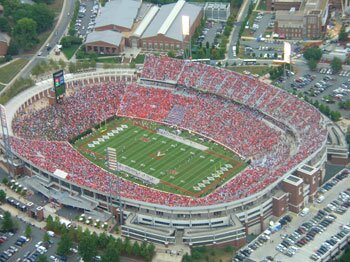
The "Power of Orange" was in full effect just before kickoff against Duke on September 24, 2005.
PHOTO BY SKIP DEEGAN/TAILWHEEL BASICS

The two recent bands for UVA football games vary wildly in style. The Virginia Pep Band incorporated a more informal "scramble" style in their halftime performances, seen here at a 2002 game, whereas the UVA Marching Band incorporates a more traditional precision marching style, seen here as they form the "power-V" in 2007.
PHOTOS BY ALEX HAM-VIRGINIA PEP BAND/TERREN IN VIRGINIA-FLICKR
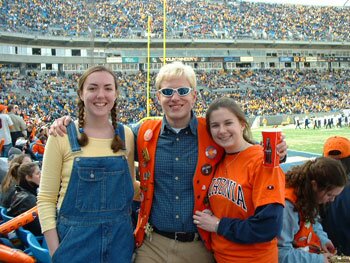
Little did they know at the time, but these three Pep Band members and their sketch in which "Dude" (center) must choose Bachelor-style between a mate from UVA or West Virginia University at halftime of the 2002 Continental Tire Bowl when they invoked the ire of both West Virginia Gov. Bob Wise (D) and ultimately led to the demise of the Virginia Pep Band.
COURTESY OF THE VIRGINIA PEP BAND
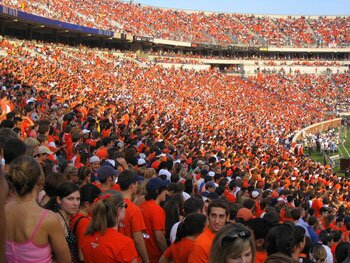
It didn't take long for a sea of orange t-shirts to replace coats and ties at UVA football games. The first request for orange from head football coach Al Groh came midway through the 2003 season. This was the scene at the home opener against Western Michigan on September 3, 2005.
PHOTO BY CHRIS FROST/FLICKR
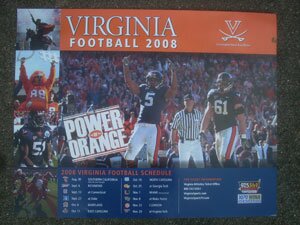
At the outset of the season, before the ban, a pair of signs– "D" + "fence"– were exalted on the official Power of Orange poster.
PHOTO BY HAWES SPENCER
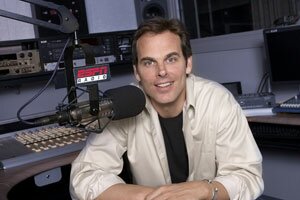
"UVA football is the softest bunch of cream-puff, bow-tie-wearing, brie-cheese eating, ascot-wearing wussies I've ever seen in my life!" said ESPN Radio's Colin Cowherd on UVA students' coat-and-tie dress code.
COURTESY OF ESPN RADIO
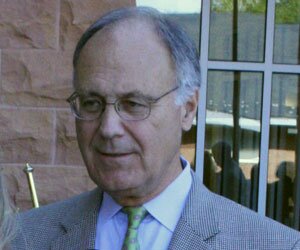
"I don't do signs," says UVA president John Casteen.
FILE PHOTO BY LINDSAY BARNES
#
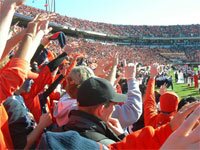
13 comments
It's an outrage. It's unconstitutional. UnAmerican. UnJeffersonian. The pep band should be allowed to poke fun at toothless hillbillies and slobbering rabbis and watermelon-chomping field hands and anyone else they darn well please.
This is America not Canada, for goodness sakes.
That's right! Though in Canada, we consider all Americans as toothless hillbillies who chomp watermelons and slobber all over their gefiltefish while sitting with the rabbi at the Dew Drop Inn.
And Pep bands are free to wear whatever color ascots they please
I was a member of the pep band. The first class that never got to play in Scott Stadium (or any AD function for that matter). It was a shame to be distrusted and vilified for actions I was never involved with. Even with the Student Council supporting a two band solution several years ago, the AD refuses to let the pep band back. So, the pep band has gone and played at Washington Nationals and Washington Capitals games on many occasions. Always asked to return, and always commented for our professionalism. Yet, the AD refuses to let us play at Olympic sports or other venues in which the marching band does not play at. Its a shame that we are considered professionals at the highest echelons of sports, yet not worthy to represent our university. Even today, the pep band continues to scramble around the parking lot at scott stadium for students and alums alike. We even perform at club sports to support our University any way we can.
Over the last six years the Pep band has proven it deserves to represent the University body once again, when will the AD listen to the students and bring this band back?
It's ok us toothless hillbuillies make fun of the members of the pep band too.
Does this mean that West Virginians can make fun of southern planters making southern comfort with their slaves? I never saw the UVA pep band ever poke fun at folks in Augusta County, or Northhampton County VA - home to a lot of privies and outhouses. Funny how the Virginia forgets what's in its own back yard.
I second Matt's comment. The Pep Band lives, and wants back in! Make room for the Pep Band in olympic sports, at least. The Pep Band can work cooperatively with the marching band, as we tried to convince the Athletic Department in 2003. Look at Virginia Tech: their Marching Virginians and Highty Tighties perform together on game day. The only thing preventing such cooperation is a stubborn Athletic Department!
Seeing as we never played the University of Augusta County, Mr. Wartell, it doesn't seem terribly relevant for the Pep Band to poke fun at Staunton-ites.
We ARE rivals of a certain Virginia Polytechnical Institute in Blacksburg, Virginia.
From a 2001 Show:
Hokie fans, welcome to beautiful Scott Stadium. We would like to remind you that re-entering the stadium is not allowed, but don't worry, we have indoor plumbing.
Rumor has it that when the University of Virginia wanted to make football a serious priority they needed to get rid of the Pep Band, both because they were "undisciplined" (where undisciplined here means independent, free-thinking, and student-run) and because the Pep Band was better entertainment than the games themselves. Old alums still have fond memories of the Pep Band.
I'm currently a second year at UVA and am a tenor sax player and conductor for the Virginia Pep Band and am greatly saddened that I cannot play on Scott Stadium's field.
My parents, both UVA alums, told me of a band with a "ridiculously long name" that everyone at the University loved because of their spirit and untraditional way of playing music. They said they were proud of having a student run band as opposed to a traditional Marching Band. When we went to the Music City Bowl in Nashville to see UVA play Minnesota, my parents were dumbfounded at the appearance of a true marching band in UVA colors. My mother was wondering where the Pep Band had gone.
Now, I'm in the Pep Band and I couldn't ask for a better group of people. What Matt Dreher said is true, we have been on good behavior, have kept our jokes to a non-offensive, but still funny, standard, and have played for numerous club sports events, which are outside of the Athletic Department's control.
I have friends in the Marching Band, and don't have any problems with them. The only problem I have is the stubbornness of the AD and their inability to reconcile differences and let us play at games that the Marching Band does not.
I'm proud to wear an orange vest and hope that one day, maybe not in my time here, but one day, The Award-Winning Virginia Fighting Cavalier Indoor/Outdoor Precision (?) Marching Pep Band & Chowder Society Review, Unlimited!!! (aka the Virginia Pep Band) will be allowed to play for the University and its students once again.
A plague on both the pep band and marching band. The pep band was dreadful and unfunny, a pale imitation of Stanford's annoying scramble band, or however they refer to themselves. Stanford is at least a decent university. The marching band is just dreadful and symptomatic of the State U. culture that Al Groh likes to foster. They should bring back George Welsh, but not the pep band.
Good story in the C'ville alternative newspaper.
If the Univ. exists to support the football team, rather than the football team exists to support the Univ. spirit, then Groh is right on target. I miss the things that made UVA football unique and fun - winning occasionally but also dressing for games, catered tailgates, the Pep Band, and the Good Ole Song.
This year was the last straw for me and is the first year since 1990 that I haven't bought football tickets - and my family is skipping any possible bowl as well.
I guess next year Groh will target the Song...
Wahoos really need to get over themselves. "Uniquely UVA" is drunken rich kids dressed to the nines with superiority complexes.